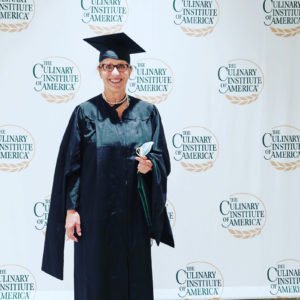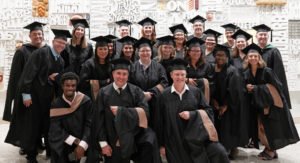9 Great Lessons from My CIA Master's Degree Program
In September 2019, I was fortunate enough to be accepted into the Culinary Institute of America's new MPS or Master of Professional Studies program in Food Business. I graduated in August 2021 with an MPS degree. It was a wonderful journey that brought me great insight into how to run a company and how to be more sustainable and engaged in our modern connected world. An MPS degree is a master's degree. I liken it to an MBA for a specific channel. I fell in love with the curriculum of entrepreneurship, branding, and sustainability for food professionals. Plus it is one of the hybrid/low-residency programs being offered at more schools now which brings working professionals together and then allows them to get a degree while they work. I attended online during the school year and visited the campus for a week in the summer.
An MPS degree is a master's degree. I liken it to an MBA for a specific channel. I fell in love with the curriculum of entrepreneurship, branding, and sustainability for food professionals. Plus it is one of the hybrid/low-residency programs being offered at more schools now which brings working professionals together and then allows them to get a degree while they work. I attended online during the school year and visited the campus for a week in the summer.
Here are the 9 lessons I learned over the program that you might find interesting.
- We took a DiSC assessment to learn our strengths about our own behavior, specifically, are you more task-oriented or people-oriented? I am not going to write at length on this topic because you can google it. The point of mentioning it, though, is to discover how to make the most of your natural talent and vision, as well as how to realize how other people are different. The best quote from our lecturer was, "All perspectives are correct." It was a profound statement that was more easily grasped after learning about DiSC. This way of thinking promotes innovation, inclusion, and collaboration for so many activities and challenges. I found myself having more curiosity and tolerance for differing opinions.
- Sustainability is important to ensure an adequate food supply for future generations. I want to leave the world a better place for my son and his children so this topic really resonates. The CIA has developed this MPS program so professional chefs and food entrepreneurs can embrace sustainability. Topics to consider include soil conservation, waste management, water conservation, organic farming practices, promoting more plant-based foods, using local farmers, helping your community, serving stakeholders, and focusing on menus planned around flavors and seasonal ingredients. There are also so many points to sustainability as a topic that you need to take the time to educate yourself and apply your own values. You vote with your wallet.
- Plant-forward is a new kitchen term that is consistent with the plant-based term that we all see in the Dietary Guidelines for Americans. It is not totally vegan or about meat analogs. The plant-forward menu we created in class was about 90% vegan. One amazing thing we did was to have all 45 cohorts make lunch. We were assigned in teams to 4 different outdoor stations and made a huge feast. I learned to make plant-forward "ricotta cheese" by soaking and grinding macadamia nuts to a fine paste and I put it on top of grilled peaches and pizza. I began a more design-thinking approach to food, considering how it is made, how it might be best enjoyed, and how it fits into a dietary pattern.
- Farm-to-table makers are fun to discover. I really enjoyed a chance to see how a 3-Star Michelin restaurant sources all fruits, herbs, grains, flowers, and vegetables from their own organic garden. If you visit Single Thread you can read all about them. Single Thread Farm and Restaurant uses food waste from the restaurant to make compost for the farm. They create detailed lists about the seeds that produce the most delicious fruits and vegetables so they grow food for flavor as opposed to looks. The strawberries we ate in the field were amazing. Local foods and local farmers are worth all the time and effort it takes to find them and buy their items to support them.
- Branding and using social media for branding, digital advertising, and networking is very important in our connected world. Branding is certainly your story and the way customers recognize you but you must think way beyond transactional communication and create a story and experience that people want to share.
- It is great to have a cohort group and community that shares your vision and pushes the knowledge and awareness of the group forward. The perspectives and stories of my cohorts were nothing short of fantastic. A good community makes learning a lot more fun and memorable and they are very effective virtually in a pandemic.
- Books are an invaluable resource for an enrichened life! Never worry if you have too many! With a kindle and audible you can keep buying and learning! It is even okay if you don't finish them all. I have too many to count and bought more as speakers were mentioning them. The nice thing about digital books is that you always have them with you and you can search for things digitally. Audible books are nice when you are walking or driving and they give your eyes a rest! I bought one by Kyle Connaughton about Japanese Pot Cooking. And another is called Hungry: Avocado Toast, Instagram Influencers, and Our Search for Connection and Meaning, by Eva Turow-Paul, which explains the millennial approach to food as community connection.
- The new CIA Copia Center or CIA Food Business School has many continuing education programs and webinars for adult learners along with their prochef program. I highly recommend them! Check out ciachef.edu to learn more. And no, I do not receive any money or kickbacks although I am an alumnus from the Hyde Park campus!
- Mentors are a valuable part of any learning process. Many of our professors were great mentors and I learned a lot from their office hours and going beyond what was required. Our entire cohort also signed up to be mentors when we were finished because we want to make a difference. It was super fun to network with all of my cohorts and to meet many guest speakers who are friends with all of the professors. The CIA network is always strong, vibrant, and full of great ideas. People are the bedrock of this program. You can follow my progress on LinkedIn.

Here are a few photos from our first residency (pre-Covid). The first two are of the Chuck Williams museum at the Culinary Institute of America Copia campus in Napa, California. Chuck was the founder of Williams and Sonoma and he donated his private collection of cooking utensils and vessels to the CIA along with the funds to display them. Next, you will see the lunch we cooked including vegan paella and aqua fresca with fresh lemon and herbs from the garden. The CIA at Greystone campus and its kitchen is featured followed by our Single Thread Farm tour and wine tasting activity.